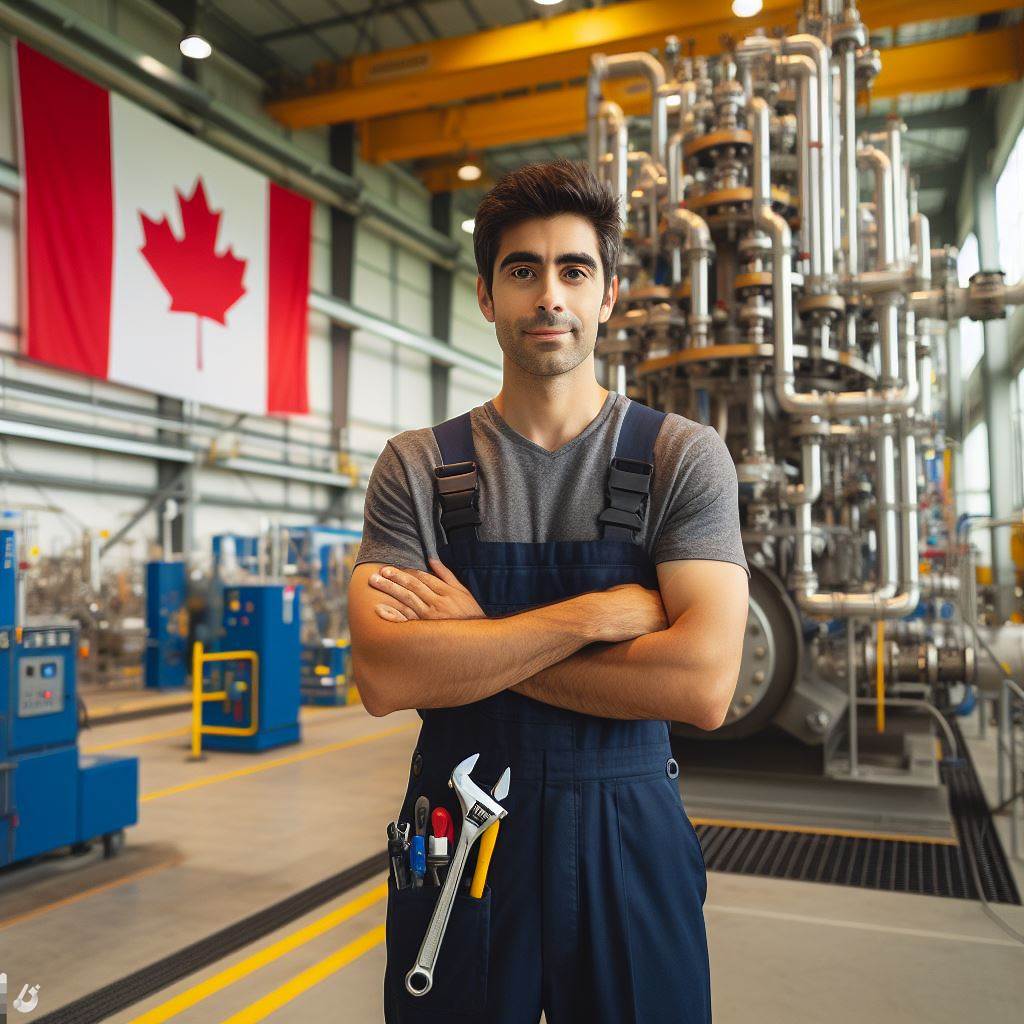Introduction
Plumbing: A Career Path with Exciting Opportunities in Canada
Discover the fascinating world of plumbing careers in Canada as we navigate through the intricate channels of this essential trade.
From foundational roles to specialized avenues, this exploration unveils the diverse opportunities that await those seeking a rewarding and dynamic profession.
Gain insights into the evolving landscape of plumbing, where traditional craftsmanship converges with cutting-edge technologies, creating a space for innovation and expertise to flourish.
In this blog post, we will explore the various career paths available in the field of plumbing in Canada.
In this journey, we’ll unravel the nuances of various career paths, exploring not only the technical aspects but also the indispensable role plumbers play in ensuring public health and safety.
From residential installations to large-scale infrastructure projects, the demand for skilled plumbing professionals continues to rise, presenting a plethora of possibilities for career advancement and personal growth.
Our purpose is to inform and inspire our audience who are interested in pursuing a career in plumbing in Canada.
Join us as we delve into the heart of plumbing careers in Canada, where each twist and turn in the pipeline offers a chance for individuals to carve out a meaningful and impactful professional journey.
Whether you’re an aspiring plumber or someone considering a career change, this exploration is your guide to understanding the vibrant and ever-evolving world of plumbing professions in the Canadian landscape.
Overview of the Plumbing Industry in Canada
Statistics and growth of the plumbing industry in Canada
- The plumbing industry in Canada has experienced significant growth over the past decade.
- According to industry statistics, there are approximately 68,000 plumbing businesses in Canada.
- This industry contributes over $4 billion to the Canadian economy annually.
- With the increase in residential, commercial, and industrial construction, the demand for plumbing services has skyrocketed.
Importance of plumbing in various sectors (residential, commercial, industrial)
- Plumbing is crucial in the residential sector as it ensures the proper functioning of water supply and drainage systems in houses.
- In commercial buildings, plumbing is essential for maintaining public hygiene through proper sanitary systems.
- Industrial sectors heavily rely on plumbing to operate complex machinery and maintain efficient water and gas distribution systems.
- Overall, the plumbing industry plays a vital role in supporting infrastructure and ensuring public health and safety.
Shortage of skilled plumbers in Canada
- Despite the growth of the industry, Canada is facing a shortage of skilled plumbers.
- Many experienced plumbers are reaching retirement age, creating a skills gap in the workforce.
- The lack of skilled plumbers has led to increased competition among businesses to attract talent.
- This shortage presents a lucrative opportunity for individuals interested in pursuing a career in plumbing.
Current demand and future projections
- The current demand for skilled plumbers is high throughout Canada.
- As more construction projects are being undertaken, the need for plumbing services continues to grow.
- In addition to demand, the plumbing industry offers stable employment and attractive earning potential.
- Future projections indicate sustained growth with the potential for new employment opportunities in the plumbing field.
In fact, the plumbing industry in Canada is experiencing tremendous growth and offers numerous opportunities for individuals seeking a secure and rewarding career.
As the demand for skilled plumbers continues to rise and the current workforce ages, there is a shortage of professionals in this field.
This presents an ideal time for aspiring plumbers to enter the industry and take advantage of the high demand and potential for future growth.
Whether it is working in the residential, commercial, or industrial sectors, a career in plumbing promises stability, attractive remuneration, and the satisfaction of contributing to essential infrastructure and public well-being.
Read: Plumber Licenses in Canada: A Detailed Guide
Education and Training
High school education requirements
In order to pursue a career in plumbing, it is essential to have a high school diploma or equivalent.
Some high schools offer vocational programs in plumbing, which can provide a solid foundation for further training.
Technical and trade schools offering plumbing programs
There are numerous technical and trade schools across Canada that offer plumbing programs.
These programs focus on providing comprehensive education and training in various aspects of the plumbing profession.
Apprenticeship programs and registration process
Apprenticeship programs are an excellent way to gain practical experience and acquire the skills needed to become a professional plumber.
These programs typically require individuals to register with a recognized apprenticeship authority or board.
Importance of obtaining a plumbing license/certification:
Obtaining a plumbing license or certification is crucial for plumbers.
It validates their skills and knowledge, demonstrates professionalism, and provides a competitive edge in the job market.
Additionally, having a license is often a legal requirement to practice plumbing in many provinces in Canada.
Plumbing programs offered by technical and trade schools
- Plumbing Systems
- Drainage and Venting Systems
- Gasfitting
- Water Supply Systems
- Piping Systems
Benefits of apprenticeship programs
Hands-on experience: Apprentices learn by working alongside experienced plumbers, gaining practical skills and knowledge.
Unlock Your Career Potential
Visualize a clear path to success with our tailored Career Consulting service. Personalized insights in just 1-3 days.
Get Started- Structured training: Apprenticeship programs typically follow a structured curriculum, covering all aspects of plumbing.
- Earning while learning: Apprentices receive a salary while learning on the job, making it a financially viable option.
- Industry connections: Through apprenticeship programs, individuals establish valuable relationships with industry professionals.
Registration process for apprenticeship programs
- Research apprenticeship opportunities in your area.
- Contact the appropriate apprenticeship authority or board to inquire about requirements and application procedures.
- Complete the application and submit all required documents.
- Upon acceptance, sign the apprenticeship agreement and begin the program.
Steps to obtain a plumbing license/certification
- Complete the necessary education or apprenticeship requirements.
- Prepare for the licensing exam by studying relevant plumbing codes and regulations.
- Register and take the licensing exam.
- Upon successful completion, apply for a plumbing license or certification through the appropriate licensing board.
In essence, pursuing a career in plumbing requires a combination of education, hands-on training, and obtaining a license or certification.
High school education or equivalent is the first step, followed by specialized training through technical schools or apprenticeship programs.
Once the necessary training is completed, aspiring plumbers must obtain a license or certification to enhance their professional credentials and job prospects.
With the demand for skilled plumbers in Canada, taking the necessary steps to establish oneself in this field can lead to a rewarding and successful career.
Read: Top Canadian Plumbing Schools & Courses for 2024
Career Opportunities in Plumbing
Residential Plumbing
- Duties and responsibilities in residential plumbing involve installing, repairing, and maintaining plumbing systems in homes.
- Work settings for residential plumbers include private companies and the option for self-employment.
Commercial Plumbing
- Duties and responsibilities in commercial plumbing include working on plumbing systems in commercial buildings, offices, and retail spaces.
- Work settings for commercial plumbers include construction companies and property management firms.
Industrial Plumbing
- Duties and responsibilities in industrial plumbing involve working with complex plumbing systems in manufacturing facilities and the oil and gas sector.
- Work settings for industrial plumbers include manufacturing facilities and the oil and gas sector.
Specialization Options
Plumbers can also specialize in specific areas, such as:
- Pipework: Plumbers who specialize in pipework focus on laying and repairing pipes to ensure proper water flow and distribution.
- Steamfitting: Steamfitters work with piping systems that transport high-pressure liquids or gases, such as steam.
- Sprinkler Systems: Plumbers specializing in sprinkler systems install and maintain fire suppression systems in buildings.
In general, career opportunities in plumbing are diverse, with options in residential, commercial, and industrial settings.
Plumbers can also specialize in various areas, expanding their expertise and increasing their marketability in the industry.
Read: Networking for Electricians in Canada: Tips

Job Outlook and Benefits
Employment prospects and growth opportunities
- Plumbing industry offers excellent employment prospects due to the growing demand for skilled plumbers.
- As urban areas expand and infrastructure projects increase, the need for plumbers continues to rise.
- The construction industry, which includes plumbing, is projected to experience steady growth in the coming years.
- Plumbers with specialized skills, such as those who can work with solar energy systems, have even better prospects.
- Overall, the employment opportunities in the plumbing field are promising for both experienced professionals and newcomers.
Competitive salaries and benefits in the plumbing industry
- Plumbers in Canada receive competitive salaries due to the demand for their services.
- According to recent reports, the average annual income for plumbers in Canada is around $65,000.
- The salary range can vary depending on factors such as experience, location, and specialization.
- Experienced plumbers who specialize in specific areas or hold supervisory positions can earn even higher salaries.
- Additionally, plumbers often receive benefits such as health insurance, retirement plans, and paid vacation.
Job stability and long-term career prospects
- Plumbing is a stable profession that provides long-term career prospects.
- There will always be a demand for plumbing services as buildings and infrastructure need maintenance.
- Plumbers who stay up-to-date with the latest technologies and advancements have better chances of career growth.
- With the aging workforce, there is a need for new plumbers to fill the gap created by retirements.
- Therefore, a career in plumbing offers stability, job security, and opportunities for advancement.
Opportunities for entrepreneurship and self-employment
- Plumbing offers excellent opportunities for those who want to start their own business.
- Many plumbers choose to become self-employed and establish their own plumbing companies.
- Being self-employed allows plumbers to have more control over their work schedule and potential earnings.
- Entrepreneurial plumbers can choose to specialize in specific areas or offer a wide range of plumbing services.
- Starting a plumbing business requires business acumen, marketing skills, and expertise in managing finances.
In brief, the job outlook for plumbers in Canada is very promising.
The industry provides excellent employment prospects and growth opportunities due to increased demand for skilled professionals.
Plumbers enjoy competitive salaries, benefits, and job stability in the long term.
Moreover, plumbing offers opportunities for entrepreneurship and self-employment, allowing individuals to establish their own businesses and have control over their career.
If you are considering a career in plumbing, you can look forward to a rewarding and prosperous profession.
Read: Troubleshooting Tips for Rookie Electricians
Challenges and Considerations
Physical demands and potential health risks
- Plumbing requires strenuous physical labor, including lifting heavy equipment and maneuvering in confined spaces.
- Plumbers are prone to injuries such as back strain, cuts, burns, and exposure to harmful chemicals.
- Proper safety measures and the use of protective gear are essential to minimize health risks.
Irregular working hours and on-call schedules
- Plumbers often encounter emergencies that require immediate attention, leading to irregular and unpredictable work hours.
- Being on-call means being ready to respond to urgent plumbing issues outside regular working hours.
- Flexibility and a willingness to work during evenings, weekends, and holidays are crucial for success in this field.
Dealing with difficult working conditions
- Plumbers work in various environments, including confined spaces, basements, crawl spaces, and outdoor sites.
- They face challenging conditions such as extreme temperatures, noise, foul odors, and unsanitary surroundings.
- Maintaining a positive attitude, adaptability, and mental resilience is vital in coping with these difficult circumstances.
Importance of continuous professional development and staying updated with industry advancements
- The plumbing industry is constantly evolving, with new technologies and techniques emerging.
- Plumbers need to acquire new skills, stay updated with building codes, regulations, and industry standards.
- Continuing education, attending workshops, and seeking mentorship opportunities are crucial for career growth.
- Embracing lifelong learning ensures that plumbers can offer high-quality services and adapt to changing customer needs.
In review, pursuing a career in plumbing offers numerous opportunities, but it is essential to consider the challenges that come with it.
Plumbers face physical demands, potential health risks, irregular working hours, and difficult conditions.
However, by prioritizing safety, maintaining flexibility, and developing a continuous drive for professional growth, individuals can thrive in this rewarding profession.
Ultimately, with dedication and a commitment to excellence, aspiring plumbers can build a successful and fulfilling career in Canada.
Conclusion
This blog post highlighted the various career paths and opportunities available in the plumbing industry in Canada.
We strongly encourage readers to consider plumbing as a viable career option due to its stability, growth, and financial rewards.
For further exploration, we recommend checking out the following resources and references:
- The Canadian Plumbing Association’s website for information on certification and apprenticeships.
- Trade schools and vocational training programs that offer plumbing courses.
- Online forums and communities where aspiring plumbers can connect with professionals.
- Local job boards and classifieds for plumbing positions and apprenticeship opportunities.
Remember, a career in plumbing can provide a fulfilling and prosperous future.
Take the plunge and start building your path to success today!




